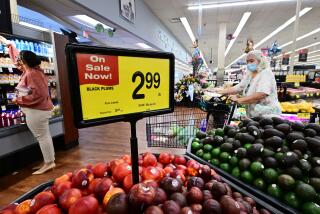Consumer prices fall for first time in 16 months on lower gas costs
Consumer prices fell in August for the first time in 16 months as lower gasoline costs helped keep inflation tame, the Labor Department said Wednesday.
The report should ease pressure on Federal Reserve policymakers, meeting this week, to start raising near-zero interest rates. Many analysts and some Fed officials have urged an increase to avoid a potential surge in inflation as the economy improves.
The Consumer Price Index, a closely watched inflation measure, decreased 0.2% last month after a 0.1% rise in July, according to the Labor Department.
It was the first decline in prices for a wide range of consumer products tracked by the government since April 2013. Analysts had expected prices to remain flat last month.
For the 12 months ended in August, consumer prices have risen 1.7%. That was down from 2% for the 12-month period that ended in July and the smallest one-year figure since March.
A 4.1% drop in gasoline prices, along with declines in costs for natural gas and fuel oil, helped push the index down, offsetting a 0.2% increase in prices for food and shelter.
Food and energy prices can be volatile. The so-called core price index, which excludes those costs, was unchanged in August after rising 0.1% in July.
For the 12 months ended in August, core prices rose 1.7%, the same as the broader price index.
“With overall prices down in August, and core prices flat, there are still no indications of increasing inflationary pressures,” PNC Financial Services Chief Economist Stuart Hoffman and senior economist Gus Faucher, said in an analysis.
“The drop in energy prices as geopolitical tensions in the Middle East and Russia and Ukraine have eased somewhat is also putting downward pressure on inflation,” they said.
The Fed has a 2% annual inflation target, although it uses a different measure based on consumer spending. The latest figure for that gauge showed inflation running at 1.6% for the year ended in July.
The policymaking Federal Open Market Committee will release a statement Wednesday after a two-day meeting and investors and analysts are looking for any change in guidance on interest rates, which have been near zero since late 2008.
The Fed, which is on track to end its bond-buying stimulus program next month, has said it expects interest rates to remain low for “a considerable time” after the program ends.
Fed Chairwoman Janet L. Yellen is likely to be pressed at a news conference Tuesday about when the Fed might start to raise interest rates in light of stronger economic growth and an improving labor market.
For breaking economic news, follow @JimPuzzanghera on Twitter







